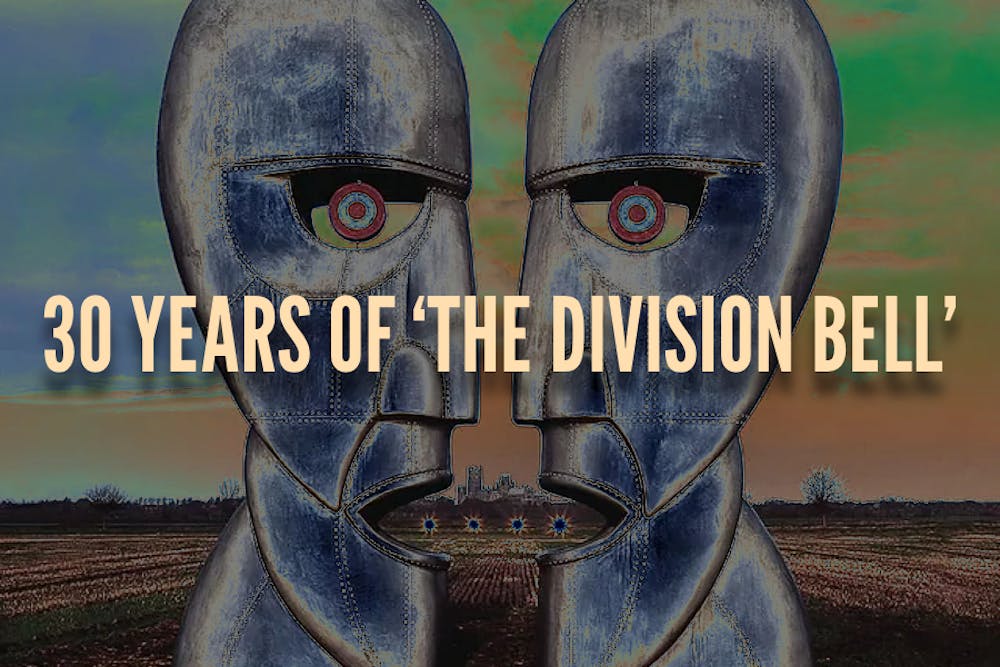By the 1990s, was Pink Floyd still Pink Floyd? Roger Waters, the band’s leader and primary creative force, had departed in 1985 after assuming more and more control over their music. Although his influence shaped masterpieces like 1977’s “Animals,” his tyrannical leadership and personal fixations eventually proved more harmful than beneficial. But without him, the band lacked vision.
Under guitarist David Gilmour’s leadership, the band released 1987’s “A Momentary Lapse of Reason,” an identity crisis of an album. It abandoned the band’s usual sound for the fleeting musical trends of the 80s, heavily relied on outside songwriters and barely featured keyboardist Richard Wright or drummer Nick Mason. It was understandable to think Pink Floyd was a lost cause by this point, and that they should have just thrown in the towel.
Nevertheless, the band decided they had one more album left in them, and they wanted to do it right this time. In 1993, Gilmour, Wright and Mason started recording new material in a more relaxed and collaborative environment. A year later, Pink Floyd released “The Division Bell,” which celebrates its thirtieth anniversary this week. Upon its release, the album was a commercial success but received mixed critical reception. It has since faded into obscurity as the rest of the Pink Floyd canon came to overshadow it. However, its dismissal by critics and Pink Floyd fans alike is entirely egregious. “The Division Bell” is a beautiful late-career album by a band finally finding internal peace while conveying deep anxieties about the crumbling world around them.
“The Division Bell” is a breath of fresh air in a decade saturated with grunge and pop punk. The album contains crisp instrumentation, lush soundscapes and smooth singing. The album's sound is atmospheric and grand, with spacious arrangements that soar and envelop the listener. Each band member gets to shine, showcasing a more holistic Pink Floyd sound. The opening instrumental track, “Cluster One,” sets the tone for the album. A grand piano and mellow guitar glide over the backdrop of ethereal synths, exemplifying Wright’s more significant presence on the album. His layered synths and beautiful chord progressions are prominent elements of the album’s compositions.
Nevertheless, Gilmour and his virtuoso guitar skills shine throughout the album. “What Do You Want from Me” is an electrifying track seeping with indignance. Gilmour sings about his frustration with people’s insatiable demands of Pink Floyd while his anthropomorphic guitar roars angrily. “Poles Apart” delves into Gilmour’s turbulent relationships with Syd Barrett and Waters, featuring superb acoustic strumming and solos. And “Marooned” showcases an incredible five-minute solo from Gilmour over a moody atmosphere crafted by Wright.
Thematically, “The Division Bell” offers profound social commentary, dispelling the myth that Pink Floyd lost lyrical substance post-Waters. Yes, the belligerent polemics of the Waters era are gone, but the band opts for more graceful reflections instead. The album is a stunningly prescient warning about the social atomization and polarization that would plague society in the following decades. The band achieves this by using their interpersonal drama as a microcosm of societal breakdown. “Lost for Words” is about Gilmour learning to overcome his debilitating hatred of Waters and seek reconciliation. “Wearing the Inside Out” is about how Wright felt dejected and isolated during his time with the band in the 80s. They’re deeply personal songs, yet their messages are highly relevant in a world full of spiteful enmity and dehumanizing treatment.
The album also expresses concerns about the world at large. “A Great Day for Freedom” is about the chaos and violence in Eastern Europe following the fall of the Soviet Union. It’s an unusually blue perspective on an event often celebrated in the West, highlighting how political upheaval can destroy relationships and separate loved ones. “Keep Talking” is about the dangers of poor communication and pleads for humanity to keep discussions open and productive. It’s impressive a band from the 1960s foresaw the internecine discourse the digital age would cause even though the internet was still in its infancy. The album’s haunting closer, “High Hopes,” achingly yearns for a past that wasn’t as frightening and uncertain as the present. It's a bleak ending devoid of hope for a positive world moving forward. Sad! All this acute, grave commentary makes the album's critical snubbing feel even more unfair, considering Radiohead were hailed as trailblazing geniuses for exploring similar themes of isolation and loneliness on their album “OK Computer,” released three years after “The Division Bell.”
“The Division Bell” deserves to be recognized as one of Pink Floyd’s best albums. The band emerged from its nadir and reminded the world of what makes them so special. The pristine production and rich compositions are endlessly captivating, and it features some of the band’s best instrumental work. Wright gets his moment in the spotlight, and Gilmour's guitar playing is as genius as ever. Furthermore, its view of a world torn asunder by polarization, isolation and miscommunication has only gotten more relevant and compelling since its release. This is a must-listen.










